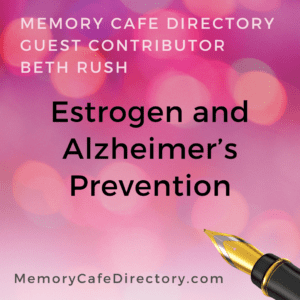Memory Cafe Directory posts and/or links to retailers can be advertising, sponsored, or affiliate links. We may earn a small commission from them. Thank you.
Estrogen can play a role in the battle against Alzheimer’s – a battle that requires constant research. The scientific community that’s dedicated to finding a prevention or cure for the disease recently published a paper that gets everyone one step closer to an Alzheimer’s-free future. Read on to learn more about the link between estrogen and Alzheimer’s to discover why the latest finding could change the game.
What Is Estrogen?
When people think of estrogen, they often think of cisgender women. They may also picture estrogen as an ingredient in birth control. Although both are accurate, it’s a hormone that helps cisgender men and women alike.
Estrogen helps reproductive systems develop, but it also aids cognitive functions and the cardiovascular system in the form of estradiol. Estradiol is the estrogen type that both biological sexes share.
The other two types of estrogen are estrone and estriol. They occur at different points in a cisgender woman’s life for varying purposes. Estrone is a weaker form that remains after menopause to continue supporting biological functions. Estriol appears mostly during pregnancies to support the development and birth of the fetus.
When Do Estrogen Levels Change?
Many factors affect a person’s level of estrogen. They may change throughout a person’s life or happen all at once. When cisgender women experience puberty, their bodies produce extra estrogen to help their physical development. This is the first spike in production before maintaining a typically high level throughout a woman’s reproductive years.
Gaining too much weight may cause those levels to drop, along with intense exercise, high blood pressure, or polycystic ovary syndrome (PCOS). Men may unknowingly decrease their estradiol production with age, a diabetes diagnosis, or a congenital condition.
Medications may also increase or decrease a person’s amount of estrogen. If someone takes steroids, prescriptions containing estrogen, or phenothiazines, they may need help regulating their typical estrogen level. It depends on their medical history and how their body interacts with new medications.
A minor decrease in estrogen as a person ages isn’t typically a cause for concern. Menopause naturally slows production because the person cannot biologically reproduce anymore. However, the drop can be sudden for some people and result in uncomfortable symptoms. It may also lead to changes in brain matter associated with Alzheimer’s.
How Are Estrogen and Alzheimer’s Linked?
A recent study published in Neurology connected estrogen and Alzheimer’s by studying women and men over 52. Researchers conducted thorough testing that analyzed each participant’s neuropsychological standing, reproductive history, and up-to-date MRI scans. Data collection created artificially reconstructed regressions to study the brain’s lack or abundance of gray matter.

Photo by Molnár Bálint on Unsplash
Gray matter exists in each person’s skull. It often has a slightly pink hue that creates the classic look of a bumpy brain. When there’s enough estrogen to regulate the neural health of each cell, the gray matter houses functioning nerve synapses, dendrites, and axon terminals that regulate bodily functions and memory.
Researchers wanted to find out if a lack of estrogen decreases the gray matter in a person’s brain and can lead to an Alzheimer’s diagnosis. They found in their 2021 study that people with longer reproductive histories – longer histories of producing estrogen – had more gray matter in their brains later in life than those with shorter histories.
More gray matter means more cellular tissue that supports cognitive functions like memory. Given that the study linked that tissue with more extended periods of higher estrogen levels, it may become a critical factor in finding treatments, cures, and preventive measures.
It could also indicate which people are more likely to develop Alzheimer’s. A patient who undergoes early onset menopause may need estrogen treatments to prevent gray matter decay early in life. Someone who receives testing that indicates little to no estrogen in their blood could also opt for scans and treatments as a preventive measure if Alzheimer’s is in their family history.
Does Estrogen Replacement Prevent Dementia?
Although the specific finding regarding estrogen is new, hormone therapy isn’t. There’s a long history in the medical field of people receiving hormone replacement therapies to ease the symptoms of aging, such as muscle pain, fatigue, and a low sexual drive.
The exact prescription changes per patient based on their biological sex, pre-existing conditions, medical histories, and personal preferences. For example, someone with a history of vaginal dryness related to low estrogen production might find relief in an intrauterine device or vaginal ring.
People can also lower their risk of Alzheimer’s by consuming more omega-3 oils in seafood and scheduling more frequent checkups for potential early diagnosis. However, targeting more at-risk populations with estrogen therapies could reduce their risk of Alzheimer’s or slow the progression. Exactly how that would happen remains unclear and requires further studies.
Potential Solutions for Hormonal Imbalances
If someone talks with their doctor and identifies a low-estrogen-production issue in addition to their family history of Alzheimer’s, they might seek hormone replacement therapies to treat both problems. There’s a variety of solutions available for hormonal imbalances to stimulate the production of estrogen or artificially replace it.
Doctors may recommend starting with natural ways to increase levels if functionality remains in the reproductive system. Maintaining a healthier weight to decrease blood pressure, eating a well-rounded diet, and exercising could improve a patient’s symptoms.
They may also want to look more closely at potentially undiagnosed chronic health conditions. A patient could have Hashimoto’s disease, Graves’ disease, or type 1 diabetes without realizing it. Those are just a few conditions that interfere with hormone production.
Depending on their medical history, pre-existing conditions, and preferences, doctors may prescribe various treatments for patients with low or no estrogen production. Available treatment methods include:
- Pills
- Patches
- Intrauterine devices
- Vaginal rings
- Creams
The best course of action will always be determined by patients and their doctors. Additional research related to the latest findings in Neurology could make it easier for people to make accurate medical decisions.
Do Treatments Have Side Effects?
Medical treatments always have side effects and hormone therapies and treatments are no different. The side effects vary depending on the patient. If they still have a uterus and need estrogen therapies or medications, they could experience symptoms like:
- An increased risk of blood clots
- An increased risk of breast cancer
- Potential gallbladder issues
- Bloating
- Breast tenderness
- Headaches
- Other symptoms associated with female puberty
Someone without a uterus, whether they needed a hysterectomy or gender-affirming surgery, might experience the same symptoms. In addition, they could have to deal with temporary effects such as:
- Hot flashes
- Upset stomach
- Insomnia
Estrogen treatments also have positive side effects when necessary for a hormonal imbalance. It makes them a viable option for people needing hormone treatment for specific conditions. Patients often find relief in the forms of:
- Reduction or elimination of hot flashes
- Stronger bones
- Improved mood regulation
- Lower risk of diabetes
- Less-frequent joint paint
- Reduction or elimination of insomnia
It all depends on how a person’s unique biological makeup reacts to the estrogen introduction method and strength. Adjusting the treatment as needed could help patients find peace from longstanding symptoms of low estrogen production while preventing the potential development of Alzheimer’s.
Look Forward to Further Estrogen and Alzheimer’s Research
Given recent findings, there may be a bright future for researchers studying hormonal imbalances and Alzheimer’s diagnoses. If results continue to prove that the two are related, hormonal treatments could eventually prevent the condition from developing or slow its progression.
About the Author
Beth Rush

Beth Rush
Beth Rush is the Managing Editor and Content Manager at Body+Mind.
Body+Mind features articles about diet, fitness, mental health, parenting and health care.
Become a Contributor!
 Do you want to be a Memory Cafe Directory contributor? If you have helpful information to share with our community, read about the guidelines, then get in touch to discuss what you have to offer.
Do you want to be a Memory Cafe Directory contributor? If you have helpful information to share with our community, read about the guidelines, then get in touch to discuss what you have to offer.
Thank you.





